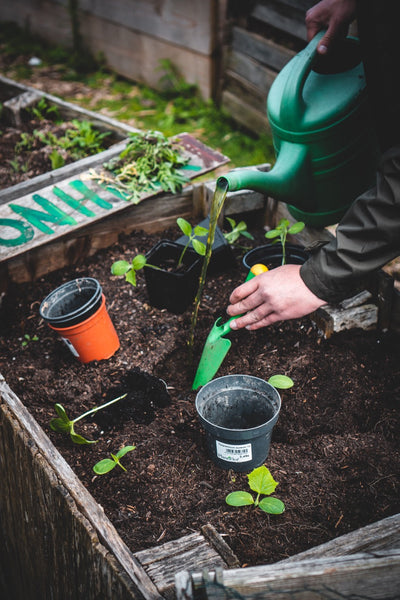Reducing Stress Through Gardening: Techniques for Improving Mental Health in the Garden
Gardening can be a great way to reduce stress and improve mental health. Spending time in nature, getting your hands dirty, and watching your plants grow can be a therapeutic experience that helps you relax and unwind. In this blog post, we'll explore some techniques for improving mental health through gardening and how to make the most of your time in the garden.

Benefits of Gardening for Mental Health
Before we dive into specific techniques, let's take a look at some of the ways that gardening can benefit your mental health:
- Reduces stress and anxiety: Spending time in nature and engaging in a physical activity like gardening can help reduce stress and anxiety levels. Gardening has been shown to lower cortisol, a hormone associated with stress.
- Boosts mood and self-esteem: Gardening can be a source of accomplishment and satisfaction, as you watch your plants grow and flourish. This can help boost your mood and self-esteem.
- Provides a sense of purpose: Gardening can give you a sense of purpose and responsibility, as you care for your plants and work towards a goal.
- Promotes mindfulness: Gardening can be a meditative activity that promotes mindfulness and relaxation.

Techniques for Improving Mental Health in the Garden
Now that we've covered some of the benefits of gardening for mental health, let's explore some specific techniques that can help you make the most of your time in the garden.
Start Small
If you're new to gardening or don't have much experience, it's important to start small. This will help prevent you from becoming overwhelmed and ensure that you have a positive experience. Consider starting with a small container garden or a few raised beds, and gradually expand your garden as you gain more experience.
Create a Garden Space That Reflects Your Personality
Creating a garden space that reflects your personality can help make gardening a more enjoyable and fulfilling experience. Think about the colors, textures, and styles that you're drawn to, and incorporate them into your garden design. Whether you prefer a formal or informal garden, a modern or traditional style, or bright colors or muted tones, there's a garden style that will suit your personality.
Incorporate Mindful Practices
Incorporating mindful practices into your gardening routine can help promote relaxation and reduce stress. Try to focus on the present moment as you work in your garden, and pay attention to your senses. Notice the sounds of birds and insects, the feel of the sun on your skin, and the smell of the earth. You can also practice mindfulness meditation in your garden, either on your own or with a guided meditation.

Connect with Other Gardeners
Connecting with other gardeners can be a great way to share knowledge, swap tips and advice, and build a sense of community. Consider joining a local gardening group, attending gardening workshops or classes, or participating in online gardening forums. This can help you feel less isolated and more connected to others who share your passion for gardening.
Frequently Asked Questions
Q: Do I need a lot of space to start a garden?
A: Not necessarily. You can start a garden in a small space, such as a balcony, patio, or even a windowsill. Consider starting with a container garden or a few raised beds, and gradually expand as you gain more experience.
Q: What are some easy plants to grow for beginners?
A: Some easy plants to grow for beginners include herbs like basil, parsley, and mint; vegetables like tomatoes, cucumbers, and lettuce; and flowers like marigolds and petunias.
Q: How often should I water my plants?
A: The frequency of watering depends on several factors such as the type of plant, the climate, and the soil type. As a general rule, most plants need to be watered when the top inch of soil is dry. However, it's important to do some research on the specific needs of each plant to ensure that you're providing the right amount of water.
Q: Can gardening be a form of exercise?
A: Yes, gardening can be a form of exercise. Activities like digging, weeding, and planting can provide a low-impact workout for your muscles and cardiovascular system.
Gardening can be a powerful tool for reducing stress and improving mental health. By starting small, creating a garden space that reflects your personality, incorporating mindful practices, and connecting with other gardeners, you can make the most of your time in the garden. Remember to take the time to enjoy the sights, sounds, and smells of nature, and to appreciate the satisfaction that comes with watching your plants grow and flourish.













